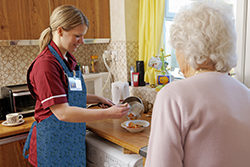
Home Health Care: 5 Ways it Can Help Seniors with Irritable Bowel Syndrome
Irritable bowel syndrome, also known as IBS for short, is a common disorder affecting many people of all ages, particularly seniors. According to the Mayo Clinic, IBS is a disorder of the large intestine, or colon, causing cramping, abdominal pain, bloating, gas, diarrhea and constipation. It is indeed a chronic condition that must be managed for the long-term. Having reliable home care is essential for elderly people who suffer from IBS. While IBS is uncomfortable, to be sure, it doesn’t cause changes in bowel tissue or elevate your risk of cancer like ulcerative colitis or Crohn’s disease can. It’s entirely possible to manage symptoms through diet control, lifestyle changes and by reducing stress. A small number need medication or counseling.
Having home health care in place to check in your loved one with IBS can be an integral part of maintaining their overall health. Here are five ways home health care can help seniors with IBS:
-
Stress Reduction
Since stress can exacerbate the symptoms of irritable bowel syndrome, it makes sense that stress reduction would be a critical way to reduce discomfort. According to the American Institute of Stress, the immune system’s defense mechanisms become impaired as we grow older, which means our ability to resist infection declines as well as the ability to respond effectively to inflammatory conditions such as IBS. These effects can be compounded by other age-related conditions such as osteoporosis, arthritis, Type 2 diabetes, cancers and dementia. Common stress relief activities supervised under home health care can include gentle exercise, fresh air, journaling, support groups, gardening, story telling, and meditating. Sometimes it helps just to chat with someone else, laugh about memories, and forget your cares for awhile.
-
Good Nutrition
At the heart of IBS is the food choices your elderly loved one makes on a daily basis. Perhaps this is one of the reasons why you got home health care for your loved one in the first place. You want them to eat right, be healthy and feel good. Nutritionists are often a part of the home health care team. They can develop menus that include foods that don’t trigger IBS symptoms, backed by a diet low in fat yet high in fiber and carbs. WebMD advises staying away from:
- Caffeine
- Alcohol
- Carbonated drinks
- Milk products
- High-sugar foods
- Fatty foods
- Beans
- Cabbage
- Broccoli
- Artificial sweeteners sorbitol and xylitol
A nutritionist can work with your loved one to keep a diary of foods that bring on symptoms of IBS after eating. Also, it’s important to drink plenty of water throughout the day.
-
Companionship
Having a companion or aide to help with meal preparation can assist in reducing symptoms of IBS. Sometimes, rushing through meals, skipping meals, or eating too much at one sitting can all aggravate irritable bowel syndrome. Understandably, you can’t be there every second of the day to ensure your loved one is taking the proper steps to a healthy diet. Aides, volunteers and companions can spend some time with the senior to ensure they are eating within a quiet, relaxed environment, chewing thoroughly, getting enough of the right foods, and not rushing through meals.
-
Exercise
Regular exercise can be helpful in reducing symptoms of IBS in the elderly. According to Medscape, exercise increases colonic motility, transit time, and transitive intestinal gas. While it may not relieve bloating, it does tend to change gas transit, which means exercise does pose some advantages to patients with IBS. Taking part in relaxing exercises such as yoga can help keep your digestive system working properly, decreasing the occurrence of constipation, adds Everyday Health.
-
On-Call Advice and Care
Sometimes, IBS is managed quite well by elderly patients. Once they are on a regular diet and exercise regimen, they can be taught how to best manage flare-ups when they occur. This means they don’t always need hands-on, round the clock care. For those times when they need assistance, have a question or are having a problem with their IBS, they can call for the help they need, when they need it. For instance, here at Pathways Home, Health and Hospice, we provide a 24/7 nurse hotline for consultation or to arrange a home visit if needed. We also offer doctor-directed home visits from a team of healthcare professionals as well as education and support to teach patients and their caregivers how to manage their IBS at home.
Contact Pathways Home, Health and Hospice
Managing chronic diseases like irritable bowel syndrome can be made easier with at-home care. We can set you or your loved one up with the care they need to thrive, even when suffering from IBS. Call us at 800-755-7855 or fill out our online form for more information.

